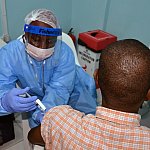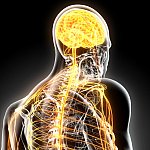The 2014-16 outbreak of the highly contagious Ebola disease in West Africa sounded alarm bells around the world. The outbreak, while alarming, was also an opportunity for researchers to test two experimental vaccines in Liberia. Both vaccines induced lasting immune responses and were found to be safe. The results are an important step in the development of an effective Ebola vaccine.
Some people are sensitive to a common type of blood thinner known as warfarin, which puts them at risk of bleeding, a life-threatening side effect. A study showed that a genetic test can help identify sensitive patients and predict the best warfarin dose to give them. Individually tailored dosing can improve the safety of this blood thinner.
To regulate blood glucose levels, people with type 1 diabetes must take insulin every day—either as a shot or with an insulin pump. A study showed that a bionic pancreas system, which relies on a continuous glucose monitor and smart phone connected to an insulin pump, was better than the usual pump method for blood glucose control. After more testing, the bionic pancreas could become another option for people with type 1 diabetes.
Combining several methods of HIV prevention significantly reduced the number of new HIV infections in a district of Uganda during a seven-year period. Large numbers of people were encouraged to adopt new behaviors, such as using HIV-suppressing treatment, having only one sexual partner, and choosing to have male circumcision. The study shows that this combined approach can reduce new HIV infections in a population.
Researchers have tested many approaches to curb underage drinking rates. But methods that work in one racial or ethnic group may not work well in another. Because American Indian teens have high rates of alcohol problems, researchers tested prevention strategies in six communities within the Cherokee Nation area of northeastern Oklahoma. Two distinct prevention strategies reduced alcohol use among American Indian and other youth living in these rural communities.
If there’s a sign that the deadly skin cancer melanoma has spread to at least one nearby lymph node, surgeons usually remove the entire cluster of lymph nodes. Although this improves the chance of removing all the cancer cells that may be there, it also causes unwanted side effects. This year, a study showed that this practice doesn’t extend life. Instead, patients can be monitored after surgery to remove a single node and then undergo more extensive surgery later, if needed.
MS develops when the immune system attacks the central nervous system. Researchers have been developing a treatment that knocks out and replaces the malfunctioning immune system.
Three-year results reported in 2015showed that most of the 24 study participants with early-stage MS survived without an increase in disability. The five-year results showed that most people didn’t worsen, despite not taking MS medications.
A study with people from economically disadvantaged communities, who are disproportionately affected by chronic low back pain, showed that a specially designed yoga class was just as effective as physical therapy for reducing pain and improving physical function. While most studies have been conducted with white, middle class volunteers, this showed that a structured yoga program is helpful to those from economically disadvantaged communities.































.png)











No hay comentarios:
Publicar un comentario